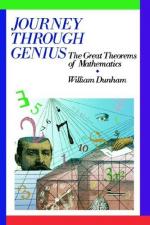
|
| Name: _________________________ | Period: ___________________ |
This quiz consists of 5 multiple choice and 5 short answer questions through A Sampler of Euler's Number Theory.
Multiple Choice Questions
1. Which of the following was true about Cardano, according to Dunham?
(a) He had three wives.
(b) He was jailed for heresy.
(c) He was not a mathematician.
(d) He was a priest.
2. What was the bases of Hippocrates's proof ?
(a) Properties of squares and cubes.
(b) Properties of area to volume measurements.
(c) Properties of triangles and semicircles.
(d) Properties of points and lines.
3. Heron's work referred to the work of what other famous scholar?
(a) Euclid.
(b) Thales.
(c) Archimedes.
(d) Hippocrates.
4. What shape was NOT demonstrated in the Elements as having a relationship to other shapes?
(a) Pentagon.
(b) Hexagon.
(c) Triangle.
(d) Hyperbola.
5. What did Heron's advances put into historical perspective for Dunham?
(a) A change in political theory across the globe.
(b) A shift in information flow that ignored socioeconomic order.
(c) A shift in learning across continents.
(d) A change in learning foundations in the ancient scholarly universities.
Short Answer Questions
1. Which of the following best describes Cardano's character?
2. What is the sum of the series 1 + 1/2³ + 1/3³ + 1/4³ ... 1/k³ . . .?
3. What didn't Euler attempt?
4. What instruments did the Greeks use to square a shape?
5. Which of the following did Dunham concentrate on as one of Newton's great advances?
|
This section contains 237 words (approx. 1 page at 300 words per page) |

|




